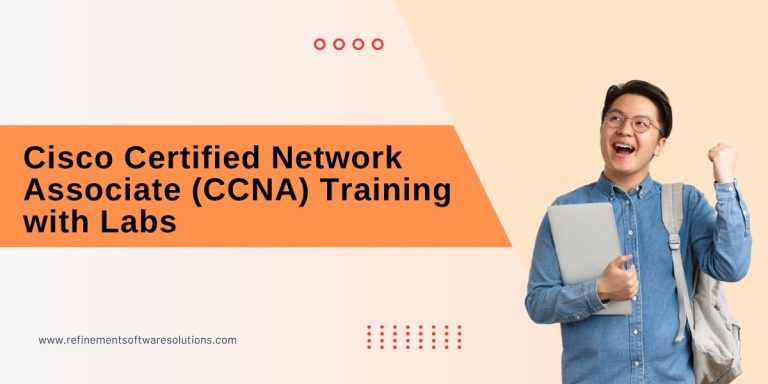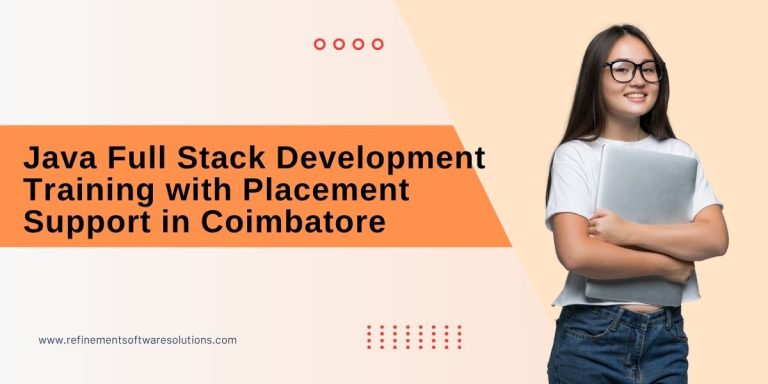Table of Contents
ToggleJava Full Stack Developers are in high demand. These professionals possess the ability to work on both the front-end and back-end of web applications, making them valuable assets in development teams. If you’re aiming to become a skilled full-stack developer in 2025, it’s crucial to understand the skills and technologies you need to master.
Whether you’re a student, a working professional looking to upskill, or someone planning a career switch, enrolling in a Java Full Stack Developer Course in Coimbatore is a smart move. Coimbatore, with its growing IT ecosystem and accessible training centers, has become a hotspot for full-stack developer training. But before you dive into a course, you should know what the roadmap looks like.
Let’s break down the essential skills, tools, and technologies you’ll need to become a successful Java Full Stack Developer in 2025.
What Is Java Full Stack Development?
A Java Full Stack Developer is someone who works with both front-end (client-side) and back-end (server-side) technologies using Java as the core programming language. They understand how to design web interfaces, interact with databases, develop APIs, and manage server deployments.
Being a full stack developer doesn’t mean you need to master every technology. It means you’re competent enough to handle both sides of application development and can collaborate effectively with other specialists in the team.
Key Skills Every Java Full Stack Developer Must Master in 2025
Here’s the roadmap structured in layers to help you learn progressively.
1. Programming Foundations (Core Java)
- Object-Oriented Programming (OOP) Concepts
- Collections, Exception Handling, Multithreading
- Java 8+ features (Lambdas, Streams, Functional Interfaces)
- Basics of JVM, JRE, JDK
Why It Matters: Java remains a reliable and secure language, and foundational understanding is critical for back-end and API development.
2. Front-End Development Skills
To be a true full stack developer, you need to master front-end technologies that control the user interface and experience.
Essential Front-End Technologies:
- HTML5 / CSS3 / JavaScript
- Responsive Design (Flexbox, Grid)
- Bootstrap / Tailwind CSS
- React.js or Angular (React is widely preferred in 2025)
Bonus Skills:
- TypeScript (strongly typed version of JS)
- Redux for state management
3. Back-End Development with Java
Once your front-end is ready, you need to build the logic and processing capabilities behind it using Java-based back-end frameworks.
Back-End Stack Includes:
- Spring Framework (Spring Boot, Spring MVC)
- REST API Development
- Spring Security & JWT (JSON Web Tokens)
This is the core of your full stack knowledge. Many professionals who enroll in a Java Course in Coimbatore are introduced to back-end programming through real-time projects using Spring Boot.
4. Database Technologies
No application is complete without data management. Learn how to work with both relational and non-relational databases.
Must-Know Databases:
- MySQL / PostgreSQL (for relational data)
- MongoDB (NoSQL databases for flexible data structures)
ORM Tools: Hibernate / JPA (Java Persistence API)
Learning SQL queries, joins, and normalization will make you efficient in building robust applications.
5. Version Control Systems (Git & GitHub)
Understanding how to use Git and collaborate through GitHub is essential for every developer today. Learn:
- Branching & Merging
- Pull Requests
- Version Control Best Practices
Employers expect you to contribute to repositories and collaborate using Git-based workflows.
6. Build Tools & Dependency Management
Modern Java projects require efficient build tools to manage dependencies and automate tasks.
Common Build Tools:
- Maven
- Gradle
Mastering these helps you set up clean and maintainable projects.
7. Web Services and APIs
Modern applications rely heavily on APIs for communication between the front-end and back-end.
Must-Learn Concepts:
- RESTful API Design
- JSON & XML Data Structures
- Consuming APIs in front-end using Axios or Fetch
8. DevOps and Deployment Basics
Knowing how to deploy your application gives you a full-circle understanding of the project lifecycle.
Tools to Explore:
- Docker (for containerization)
- Jenkins (for CI/CD pipelines)
- AWS / Azure / Google Cloud Platform (for cloud deployment)
- Heroku / Netlify / Vercel (for small-scale deployment)
9. Testing and Debugging
Applications must be tested for performance and security.
Key Tools:
- JUnit (for unit testing)
- Mockito (for mocking dependencies)
- Postman (for API testing)
Debugging is equally important – learn to use IDE debuggers effectively.
Soft Skills & Project Experience
Apart from technical skills, recruiters look for the following:
- Problem Solving
- Communication
- Time Management
- Team Collaboration (especially in Agile/Scrum setups)
Must-Have Java Full Stack Projects for Your Portfolio
Here are 3 beginner to intermediate project ideas:
- Job Portal Application – Includes user roles, authentication, job posting, and job application logic.
- Online Bookstore – E-commerce site using React and Spring Boot.
- Student Management System – A CRUD application with MongoDB and Spring Boot.
These projects can be showcased on GitHub and are often part of Java Full Stack Developer Course in Coimbatore training curriculums.
FAQs – Java Full Stack Developer Roadmap
Q1: How long does it take to become a Java Full Stack Developer?
A: It usually takes 4 to 6 months of dedicated learning with real-time projects.
Q2: Is Java Full Stack still in demand in 2025?
A: Yes, Java continues to be one of the top choices for enterprise and web application development.
Q3: Should I learn both Angular and React?
A: Not necessary. Pick one and become proficient — React is more beginner-friendly and widely used.
Learning Path Summary
Skill Area | Recommended Learning Time |
Core Java | 3–4 weeks |
Front-End (HTML/CSS/JS) | 3–4 weeks |
JavaScript Framework (React/Angular) | 4–6 weeks |
Spring Boot + REST API | 6 weeks |
Databases (MySQL/MongoDB) | 3 weeks |
Git, Maven, Testing, DevOps | 3–4 weeks |
Projects + Portfolio | Ongoing |
Where to Learn Java Full Stack in Coimbatore?
If you are serious about mastering this roadmap, consider joining a Java Full Stack Developer Course in Coimbatore from Refinement Software Solution. These courses offer:
- Structured learning modules
- Hands-on projects
- Mentorship from experienced trainers
- Placement support
Whether you are a student or a working professional, choosing a reputed institute can speed up your learning process significantly.
Many institutes also offer offline and online blended programs, ensuring flexibility and individual attention.
Conclusion
Becoming a Java Full Stack Developer in 2025 is a strategic decision for long-term career growth. The demand is increasing across industries—from startups to MNCs—especially for developers who can independently handle both client and server-side operations.
By following the roadmap and enrolling in a quality Java Fullstack Training in Coimbatore, you can build a rewarding and future-proof career in tech. Remember, consistency in learning and hands-on practice are key to success.
So, start your journey today—because the future belongs to those who can build it from end to end.




